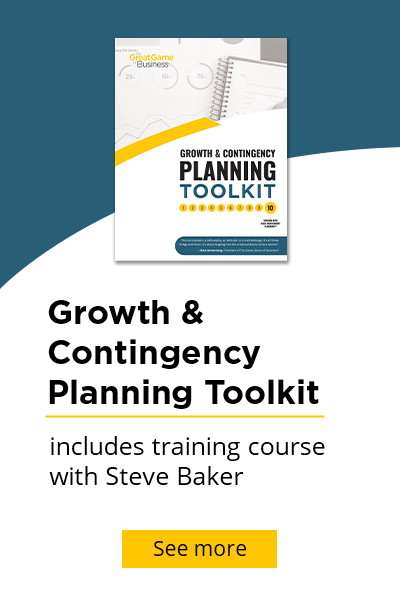
When companies implement The Great Game of Business, the company's leadership are often expected to get up to speed quickly. They’re asked to teach things they may not know and share information they’ve always kept close to the vest. They’re also expected to change their personal management style, often abruptly.
In this situation, it shouldn’t be surprising if some managers leave and the rest feel threatened, confused or angry. Chances are they’re all asking themselves the same question: “As employees learn more about the business and take more responsibility for posting good results, then what’s my role?” Meanwhile, they're being peppered with questions from the front line: “What’s all this about, anyway? Do we really have to do this?” If your managers shrug or answer cynically, your program is over before it starts.
The truth is that savvy managers often make the difference between success and failure when it comes to implementing the Great Game. That’s why it should be a priority to help them, not just your front-line associates, understand the whole concept of the Great Game of Business®,
-
- involve them in discussions about the process of change
- and provide whatever training they need in financial literacy and other open-book skills.
Here are six tips you can use to get—and keep— your key managers in The Game
 Demystify Open-Book Management
Demystify Open-Book Management
- Hold a casual retreat on the golf course or at a bowling alley to lay everything out, find common ground and create plans.
- Make sure everyone involved has a clear picture of the process and their role in opening the books.
 Prepare Managers for Their New Leadership Role
Prepare Managers for Their New Leadership Role
- Set up a learning center of GGOB resources (being part of the GGOB Community Site is a great place to send them)
- Create a list of FAQs
- Stage mock Huddles to get managers comfortable with the numbers.
- You can also create a reading list that includes classics such as Stephen Covey's The Seven Habits of Highly Effective People and The Eight Habit: From Effectiveness to Greatness, in addition to First, Break All the Rules and Now, Discover Your Strengths, by Marcus Buckingham and Curt Coffman, and of course, Get in the Game by Rich Armstrong and Steve Baker.
 Visit Other GGOB Companies
Visit Other GGOB Companies
- Attending the Great Game of Business Conferences to learn Great Game fundamentals, attend a Huddle, and network with other practitioners is the perfect way to get your leadership up to speed.
- Visiting other players of the Great Game also creates opportunities to create personal connections and mentor/mentee relationships for your managers.
 Walk the Talk
Walk the Talk
- GGOB managers teach, coach, facilitate discussion, and keep teams moving in the right direction. Sure, not every manager will make the transition to the new style, but most will, particularly if the CEO and senior executives model the new approach.
 Give Managers New, Meaningful Tasks
Give Managers New, Meaningful Tasks
- Once you’ve got The Game underway, ask managers to update the vision/values statement and any guiding principles and practices related to knowledge management, employee education and involvement, and great leadership development.
- Challenge them to come up with new programs that support the open-book effort and enhance the culture.
 Develop New Opportunities for Personal Growth
Develop New Opportunities for Personal Growth
- If managers are successful coaches, their people will be able to assume many responsibilities themselves. That frees up managers to take on special projects, learn new skills, or head up entrepreneurial spin-offs.
- Here, you might follow SRC’s advice:
- strengthen your performance-management system
- start a succession plan
- offer career planning and mentoring “services”
- maybe launch your own Leadership Academy
Other articles you might like:
.png)








.png)




-5.png)

